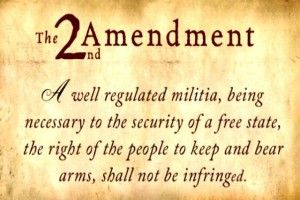CA joins national gun standoff
by James Poulos | May 14, 2014 12:02 pm
 It’s a gun standoff like in a Quentin Tarantino movie — barrels pointed but nothing resolved for now. That’s why gun law in California and the rest of America won’t be standardized anytime soon.
It’s a gun standoff like in a Quentin Tarantino movie — barrels pointed but nothing resolved for now. That’s why gun law in California and the rest of America won’t be standardized anytime soon.
This month, the U.S. Supreme Court declined[1] to take up the issue. On appeal was a New Jersey case, Drake v. Jerejian,[2] about a state law requiring a “justifiable need” to obtain a gun permit.
New Jersey’s “justifiable need” standard was narrow and strict. It required[3] would-be buyers to prove they faced “specific threats or previous attacks” that demonstrated a “special danger” to their lives “that cannot be avoided by other means.”
But rather than affirming or striking down the law, the Supreme Court stayed away from the case — without commenting as to why.
Previous rulings still stand. In District of Columbia v. Heller[4], decided in 2008, the justices affirmed a constitutional right to purchase arms for personal use, including self-defense in the home. In McDonald v. Chicago[5], decided two years later, the Court also affirmed that this right applied equally to gun laws adopted by state and federal governments.
 CA confusion
CA confusion
Since then, however, lower courts have been forced to consider what kinds of regulations pass the Heller test — and which don’t. As a result, gun law in California has reached a standoff.
California’s legal confusion involves not only “concealed carry[6]” laws, which allow someone to hide a gun on his person. They also concern “open carry[7]” laws, in which a gun is displayed openly, so people can see it.
Three years ago, lawmakers passed[8] Assembly Bill 144, which made it a misdemeanor to openly carry a firearm. Gov. Jerry Brown signed the bill.
After that, gun owners focused their interest on “concealed carry” permits. Under California law, county sheriffs determine how those permits are granted. In general, until now, urban county sheriffs have placed stiff limits on the permits, while more rural counties have been generous handing out the privilege.
In Peruta v. County of San Diego[9], however, in February the 9th Circuit Court of Appeals considered a lawsuit against San Diego County, which required applicants for a Concealed Carry Weapon license to demonstrate “good cause.” The court ruled[10] that this CCW requirement violated the Second Amendment, essentially mandating concealed-carry permits for any law-abiding person after taking a gun-safety course.
The final outcome of the Peruta case is not entirely certain. On May 1, the 9th Circuit ordered [11]the sheriff to clarify his status on appeal.
Conflict
If the 9th Circuit continues in its course, it sets up a conflict between two circuit courts: Back East, the 3rd Circuit Court of Appeals upheld the state regulations in the Drake case. But out here in California the 9th Circuit struck down San Diego County’s regulations.
It’s not constitutionally clear how those two rulings square with one another. Commonly, but not always, the Supreme Court acts to clarify clashing Circuit Court opinions.
But for now, California counties, activists and citizens are facing the rush for gun permits. In Orange County and surrounding areas, applications for concealed carry permits have surged. In the two months since the Peruta ruling, the New York Times reported[12], some 4,000 residents have applied. That’s more than eight times the typical annual figure.
The Times noted California Attorney General Kamala Harris told the court she sees the ruling as a threat to public safety. In the absence of higher court action, however, Harris is largely limited to talk.
Moreover, Harris is running for re-election this year. According to her campaign website[13], controlling guns is part of her strategy of combating gangs. It also appeals to the liberal “base” that forms the core of her financial and political support.
She also is a likely candidate for governor in 2018, when term limits would force Gov. Jerry Brown to retire if he’s re-elected in 2014. Anti-gun constituencies are crucial to any Democratic candidate for governor.
Meanwhile, a 2012 report from the Congressional Research Office indicated[14] that, from 1994 to 2009, Americans bought more than 100 million new firearms — and gun-related murder rates dropped nearly in half.
Widening impact
The Peruta ruling is already influencing lawmakers elsewhere. The Senate in the territory of Guam, for instance, recently passed[15] a bill requiring police to grant concealed-carry permits to qualified applicants. That takes away the Guam Police Department’s ability to withhold permits, as it often has in the past.
Although Guam is far afield from the mainland United States, the Peruta ruling ensures that Second Amendment advocates have the legislative momentum, even where anti-gun groups are strong. At least for now.
- declined: http://www.washingtonpost.com/politics/supreme-court-declines-to-review-new-jerseys-handgun-permit-law/2014/05/05/25f0fcd6-d457-11e3-95d3-3bcd77cd4e11_story.html
- Drake v. Jerejian,: http://www.scotusblog.com/case-files/cases/drake-v-jerejian/
- required: http://www.usnews.com/news/politics/articles/2014/05/05/high-court-nixes-nj-appeal-on-gun-rights-in-public
- Columbia v. Heller: http://www.oyez.org/cases/2000-2009/2007/2007_07_290
- McDonald v. Chicago: http://www.oyez.org/cases/2000-2009/2009/2009_08_1521
- concealed carry: http://www.usacarry.com/articles/concealed-carry/
- open carry: http://www.opencarry.org/
- passed: http://www.leginfo.ca.gov/pub/11-12/bill/asm/ab_0101-0150/ab_144_bill_20110601_amended_sen_v97.html
- Peruta v. County of San Diego: http://www.ca9.uscourts.gov/content/view.php?pk_id=0000000722
- ruled: http://www.ca9.uscourts.gov/content/view.php?pk_id=0000000722
- ordered : http://cdn.ca9.uscourts.gov/datastore/general/2014/05/01/10-56971%20-%20Order.pdf
- reported: http://www.nytimes.com/2014/04/27/us/politics/in-california-a-fevered-rush-for-gun-permits.html?_r=1
- According to her campaign website: http://kamalaharris.org/issues/transnational_gangs/
- indicated: http://www.fas.org/sgp/crs/misc/RL32842.pdf
- passed: http://www.guns.com/2014/05/10/shall-issue-legislation-passes-in-guam-cites-peruta-case-as-reason/
Source URL: https://calwatchdog.com/2014/05/14/ca-gun-laws-may-soon-shift/